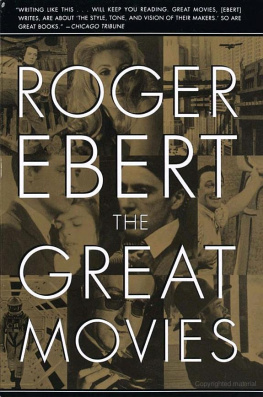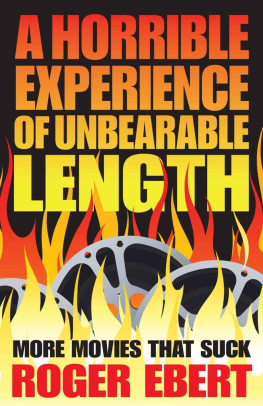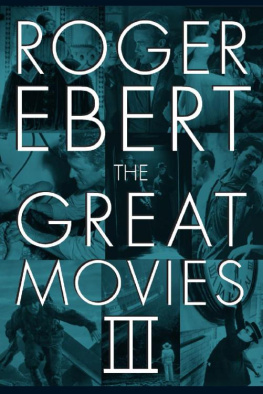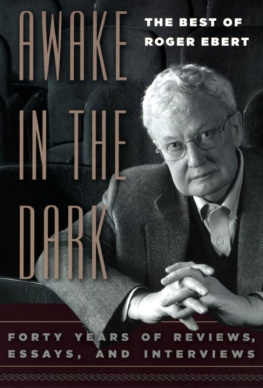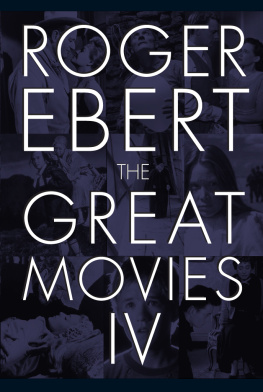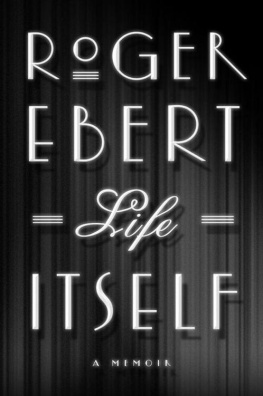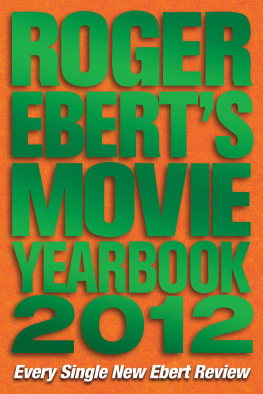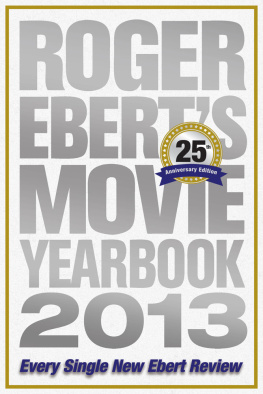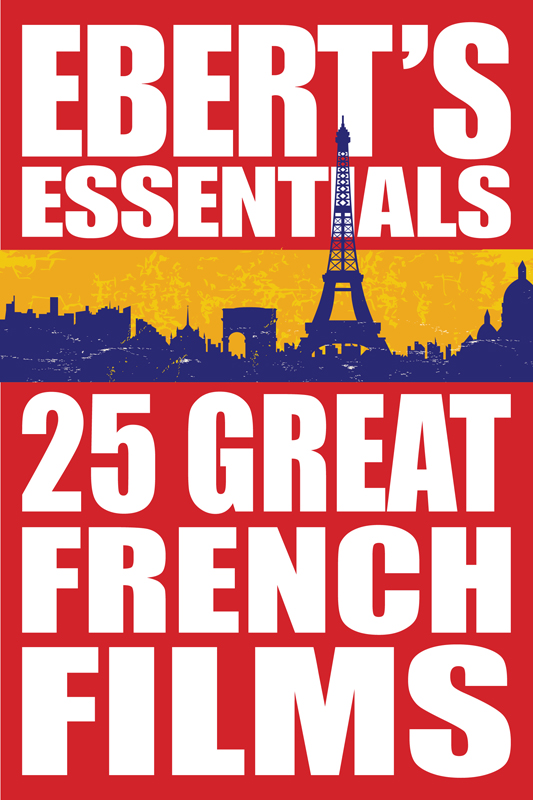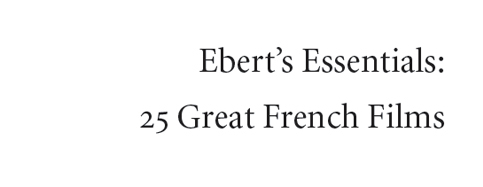
Other Books by Roger Ebert
An Illini Century: One Hundred Years of Campus Life
A Kiss Is Still a Kiss
Two Weeks in the Midday Sun: A Cannes Notebook
Behind the Phantoms Mask
Roger Eberts Little Movie Glossary
Roger Eberts Movie Home Companion (annually 19861993)
Roger Eberts Video Companion (annually 19941998)
Roger Eberts Movie Yearbook (annually 19992007, 20092012)
Questions for the Movie Answer Man
Roger Eberts Book of Film: From Tolstoy to Tarantino,the Finest Writing from a Century of Film
Eberts Bigger Little Movie Glossary
I Hated, Hated, Hated This Movie
The Great Movies
The Great Movies II
Your Movie Sucks
Roger Eberts Four-Star Reviews 19672007
Awake in the Dark: The Best of Roger Ebert
Scorsese by Ebert
Life Itself: A Memoir
A Horrible Experience of Unbearable Length
With Daniel Curley
The Perfect London Walk
With Gene Siskel
The Future of the Movies: Interviews with Martin Scorsese,Steven Spielberg, and George Lucas
DVD Commentary Tracks
Beyond the Valley of the Dolls
Citizen Kane
Dark City
Casablanca
Crumb
Floating Weeds
Other Eberts Essentials
33 Movies to Restore Your Faith in Humanity
25 Movies to Mend a Broken Heart
27 Movies from the Dark Side
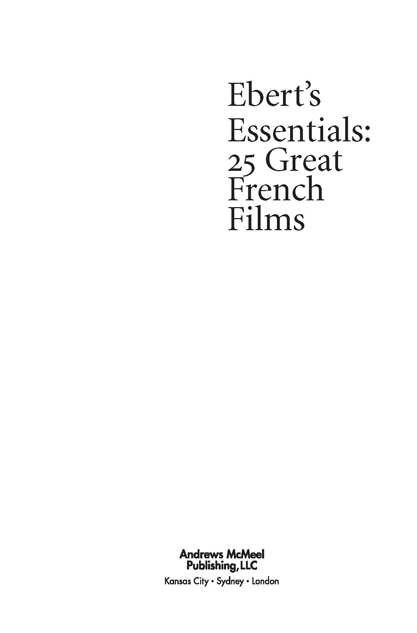
25 Great French Films copyright 2012 by Roger Ebert. All rights reserved. No part of this book may be used or reproduced in any manner whatsoever without written permission except in the case of reprints in the context of reviews.
Andrews McMeel Publishing, LLC
an Andrews McMeel Universal company
1130 Walnut Street, Kansas City, Missouri 64106
www.andrewsmcmeel.com
ISBN: 978-1-4494-2149-6
All the reviews in this book originally appeared in the Chicago Sun-Times.
Attention: Schools and Businesses
Andrews McMeel books are available at quantity discounts with bulk purchase for educational, business, or sales promotional use. For information, please e-mail the Andrews McMeel Publishing Special Sales Department:
Contents
Introduction
The three great cinemas of the world, it is generally agreed, are those of Hollywood, France, and Japan. Generalizations are dangerous, but in recent years, France seems to be in the lead. That may be because most new French films are made for adults, about adults. Upon the shoulders of Hollywood falls the weight of supplying the global market for action and violence. Hollywood also satisfies that market for France itself, leaving the field for grown-up films to the French.
France has a claim to have coinvented the cinema with some of the earliest filmmakers in the world. Scorseses Hugo (2011) introduced a new audience to the magic of Georges Mlis, whose works such as A Trip to the Moon (1902) showed a man delighted by the tricks he could play with special effects.
France also claims to have discovered Hollywood cinema, doing us a favor. The auteur theory, created by the critics and directors around the magazine Cahiers du Cinma, celebrated well-made genre works that were dismissed as B movies by American critics, but praised by the French as masterworks. Such directors as Hawks, Sturges, Ford, and Minnelli joined a new pantheon.
From that period came forth the French New Wave, introducing a new group of French directors who were mostly critics for the magazine. In this e-book Ive provided a sample of their films: Malles Au Revoir les Enfants; Godards Breathless; Truffauts The 400 Blows, Day for Night, and Jules and Jim; Rivettes Le Belle Noiseuse; and Chabrols Le Boucher.
Then there are the great pioneers, most notably Jean Renoir, whose The Rules of the Game is often cited as one of a handful of the greatest of all films, and his Grand Illusion is often on the same lists. Luis Buuel, from Spain, made films in Mexico and then made many contributions to the French cinema, of which Ive suggested Belle de Jour and The Discreet Charm of the Bourgeoisie.
No category exists that includes Jacques Tati, a great original, whose Mr. Hulots Holiday invents a way of drawing great humor from characters regarded fixedly with fascination and consternation. There is a pair of 1991 films here by Yves Robert, My Fathers Glory and My Mothers Castle, both based on books by Marcel Pagnol. Together they make a remarkable impression, but are rarely seen today. They might be a discovery for you.
Two other films, The Hairdressers Husband and The Man on the Train, are by Patrice Leconte, a stand-alone original who likes characters who frankly embrace their eccentricities.
And what can we make of Cach, a spellbinding film with a great puzzle it circles but never is able to quite resolve. I was so incautious to try to explain it in a blog, and inspired tens of thousands of words from readers trying to set me, or each other, straight.
And there are several more. The pleasure of a little collection like this is in imagining readers finding treasure in the glory of French films and continuing to explore.
R OGER E BERT
Key to Symbols
 | A great film
|
G, PG, PG-13, R, NC-17 : Ratings of the Motion Picture Association of America
|
| G | Indicates that the movie is suitable for general audiences
|
| PG | Suitable for general audiences but parental guidance is suggested
|
| PG-13 | Recommended for viewers 13 years or above; may contain material inappropriate for younger children
|
| R | Recommended for viewers 17 or older
|
| NC-17 | Intended for adults only
|
| 141 m. | Running time
|
| 2011 | Year of theatrical release |
Amlie

R, 115 m., 2001
Audrey Tautou (Amlie Poulain), Mathieu Kassovitz (Nino Quicampoix), Rufus (Raphal Poulain), Yolande Moreau (Madeleine Wallace), Artus de Penguern (Hipolito [The Writer]), Urbain Cancelier (Collignon [The Grocer]), Dominique Pinon (Joseph), Maurice Bnichou (Dominique Bretodeau [The Box Man]), Claude Perron (Eva [The Stripteaser]). Directed by Jean-Pierre Jeunet and produced by Jean-Marc Deschamps and Claudie Ossard. Screenplay by Jeunet and Guillaume Laurant.
Jean-Pierre Jeunets Amlie is a delicious pastry of a movie, a lighthearted fantasy in which a winsome heroine overcomes a sad childhood and grows up to bring cheer to the needful and joy to herself. You see it, and later when you think about it, you smile.
Audrey Tautou, a fresh-faced waif who looks like she knows a secret and cant keep it, plays the title role, as a little girl who grows up starving for affection. Her father, a doctor, gives her no hugs or kisses, and touches her only during checkupswhich makes her heart beat so fast he thinks she is sickly. Her mother dies as the result of a successful suicide leap off the towers of Notre Dame, a statement that reveals less of the plot than you think it does.


